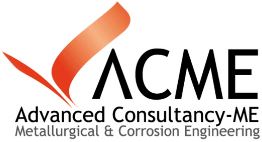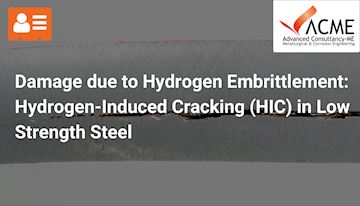Damage due to Hydrogen Embrittlement: Hydrogen-Induced Cracking (HIC) in Low Strength Steel
Damage due to Hydrogen Embrittlement: Hydrogen-Induced Cracking (HIC) in Low Strength Steel
-
Unlimited Team-wide Access
-
Advance Technical Competences
-
Courses by Industry Authorities
Additional
Quotation for your TeamAbout the course
The occurrence of hydrogen embrittlement is a much-researched phenomenon, known to cause mechanical property degradation and catastrophic failures. This form of cracking is especially detrimental and often observed in oil country tubular goods (OCTG) which are subjected to sour gas. Consequently, the significance of HIC is most appreciated by oil companies at various stages of oil extraction, transportation, and storage.
In this training course participants will be taught the fundamentals of hydrogen embrittlement, also known as Hydrogen Induced Cracking (HIC), and gain a comprehensive understanding of the causes, mechanisms, and effects of hydrogen embrittlement in low-strength steels. The core focus is to teach how to identify factors influencing HIC susceptibility and learn about the various factors, including material composition, processing conditions, and environmental factors, that contribute to the susceptibility of low-strength steels to hydrogen-induced cracking.
The course addresses a significant concern in various industries and processes, equiPiping professionals with the knowledge and skills to prevent and mitigate HIC in low-strength steels. Thereby ensuring safety, reliability, and cost-effectiveness in the use of these materials. Participants will gain in-depth knowledge of the HIC phenomena and applicable risk assessments, and learn practical approaches to ensure the safety and reliability of low-strength steel structures and components. The course combines theoretical concepts with real-world case studies and examples.
The course consists of 12hr of live sessions with the instructor. All training content is provided through your EngineeringTrainer account.
Meet your instructor
Instructor
ACME
Materials Science, Metallurgy

Learning Outcomes
After this course, you...• have learned key aspects of Hydrogen• Induced Cracking in low• strength steel,
• know the mechanism for Hydrogen• Induced Cracking and have seen how this is impacted by the material mechanical properties and process conditions,
• have the knowledge and skills necessary to identify, assess, and mitigate the risks associated with Hydrogen-Induced Cracking,
• familiar with the field and plant monitoring and inspection techniques for Hydrogen-Induced Cracking,
• understand fit• for• purpose testing of metallic materials for sour service. • be able to contribute to the safe and reliable use of low• strength steels in various industries,
• have enhanced your professional competence in materials science and engineering.
Who should attend this course
Professionals involved in industries where steel piping is used. The course is particularly relevant for:• Engineers and Technicians; Industry Professionals.
• Quality Control and Assurance Personnel.
• Inspectors and NDT Specialists.
• Researchers and Academics
• Health, Safety, and Environment (HSE) Professionals.
Prerequisites
Participants should have a basic understanding of engineering principles, particularly in areas related to materials science, corrosion, and pipeline engineering.• Familiarity with Steel Materials
• Basic Corrosion Concepts
• NDT and Inspection Techniques
Program & Details
-
Issues and Concerns
Live
1. Occurrences in pipelines and pressure vessels handling sour gas and oil:
2. Upstream and downstream operations
3. Gas transmission pipelines
4. Hydrofluoric acid service
5. Others -
Hydrogen Induced Cracking Mechanism
Live
I1. ncluding the metallurgical and environmental conditions affecting the likelihood of HIC development.
2. The related mechanism “Stress-Oriented Hydrogen-Induced Cracking” will also be described. -
Laboratory Testing Methods
Live
HIC-resistant steel purchase specification quality assurance testing and acceptance criteria.
-
Field and Plant Monitoring Techniques
Live
1. Field and plant monitoring techniques play a crucial role in assessing the condition, performance, and integrity of various industrial assets.
2. In this module the application of commonly used field and plant monitoring techniques, such as Non-Destructive Testing (NDT) and Thermography, are explained from the perspective of HIC. -
Inspection and Techniques
Live
1. There are several techniques: Visual Inspection; Liquid Penetrant Testing (PT); Magnetic Particle Testing (MT); Ultrasonic Testing (UT): Ultrasonic Phased Array (PA): Radiographic Testing (RT); and Computed Tomography (CT), etc.
2. These techniques are used in various industries to inspect, test, or evaluate materials, and components. NDT is crucial for ensuring the safety, reliability, and quality of products, as well as for identifying defects or flaws in materials and structures. Additionally, NDT plays a crucial role in ensuring compliance with industry standards and regulations.
-
Metallurgical Control Methods
Live
1. New construction or replacement materials
2. Specification of HIC-resistant steel
3. Avoidance of HIC-New linepipe.
4. Recommended specification for hydrogen embrittlement linepipe. -
Environmental Control Options
Live
1. Chemical inhibition
2. Coatings
3. Development of protective scales, etc.
-
Selection of Test Method and Acceptance Criteria
Live
1. Fit-for-purpose testing of metallic materials for sour service!
2. Test environment
3. The test method
4. The interpretation and application of the test results
5. Acceptance criteria NACE TM-0177 Method A/D, 4-Point Bend, C-Ring, etc. -
Hydrogen Failure Mechanism, Failure mitigation and Material Selection
Live
1. Minimize effects of hydrogen through careful selection of materials
2. Material selection: base metals, weld metals, and fabrication practices, as well as adherence to procedures
Certification

Gain Access to the Course

Why choose EngineeringTrainer?
-
Unlimited Team-wide Access
-
Advance Technical Competences
-
Courses by Industry Authorities
Since using EngineeringTrainer our internal mentorship has a much more matured character.
Logan Chapman - COO at Chapman Consulting Inc.








